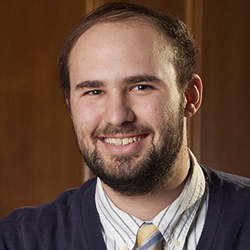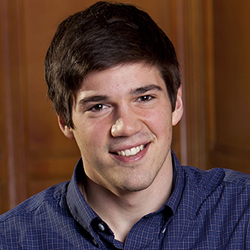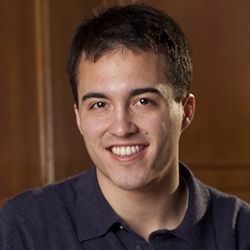
Each year, several graduating seniors conduct year-long thesis projects by working one-on-one with a faculty member or graduate student to make an intellectual contribution to their chosen field of study. The topic can be tailored to the student’s individual interest and may be done in the form of a paper, narrative nonfiction essay, creative writing project, journalistic article, documentary film, or museum exhibition. The senior thesis project is the perfect opportunity for students to showcase the research, analysis, writing, and presentation skills they have developed as undergraduates.
Below are honors students who either majored or minored in mathematics and completed thesis projects this year.
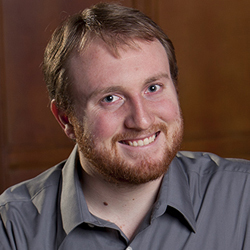
Matt Charnley
Department of Chemical and Biomolecular Engineering
Minor in Mathematics
Advisor: Nancy Stanton
Thermal Detection of Inaccessible Corrosion
“My thesis covers two parts: One discusses the field of Inverse Problems and how it can be used to find corrosion on the hidden face of a metal plate. The other discusses finding solutions of Laplace's Equation in arbitrary domains. I chose this topic because it branched off of research that I did this past summer at Rose-Hulman Institute of Technology.”
Sean Meehan
Department of Mathematics, Honors
Advisor: David Galvin
On the Topic of Ramsey Theory
“Ramsey Theory describes certain conditions under which order must appear mathematically. In all of these instances, we find the smallest number of elements so that a certain property will be guaranteed to occur. Ramsey Theory is fascinating and directly coincides with what I would like to study in graduate school. It incorporates combinatorics and graph theory, which are relatively new branches of mathematics that have applications in areas such as optimization, ergodic theory, and computer science.”
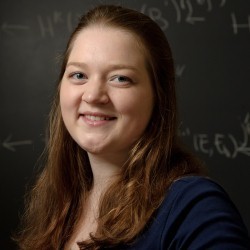
MurphyKate Montee
Department of Mathematics, Honors
Double major in music (vocal performance)
Advisor: Frank Connolly
On Characteristic Classes of Complex Vector Bundles
“My thesis focuses on a construction of the Chern classes of complex vector bundles via algebraic topology and classifying spaces. It's an interesting topic and great background for research in topology.”
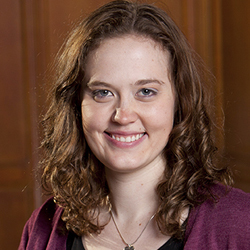
Katherine Ritchey
Department of Mathematics, Honors
Advisor: Dennis Snow
Linear Error Correcting Codes
“When digital data is transmitted through an unreliable communication channel, errors can often occur, causing the information received to differ from what was sent. Fortunately, there are ways to encode data so that errors can be detected and even corrected. My thesis focuses on a special class of codes, called linear codes, which have particularly nice properties when it comes to error detection and correction. When I first heard about this topic, I was very interested to know the mathematics behind codes that enables error detection and correction to occur.”
Edward Sanchez
Department of Mathematics
Minor in philosophy
Advisor: Claudia Polini
Equivalent Formulations of the Cayley-Bacharach Theorem for Points in Projective Space
“In my thesis, I present the background of the Cayley-Bacharach Theorem and explain its classical formulation. I then examine conditions that provide for equivalent results for finite collections of points in projective space. These conditions incorporate the Hilbert function, h-vector, and the integral closure of the coordinate ring. I find algebraic geometry very interesting, and this particular topic allows me to closely examine the geometry of sets of points and how it can interact with algebraic structures. The interaction, measured in our case by the Hilbert function, is for me a remarkable and interesting phenomenon.”
James Schmidt
Department of Mathematics
Triple major in philosophy and mechanical engineering
Advisor: Cameron Hill
Forcing in Algebra (E.C. Groups)
“Forcing was originally developed as a method to prove independence results in set theory (e.g., of the continuum hypothesis in ZCF). It has greater application in math, and in particular model theory, as constructing models often provides us with information about various mathematical structures. In this case, I am looking at how forcing can be used in group theory. I like algebra and logic so this topic is a perfect marriage of the two.”
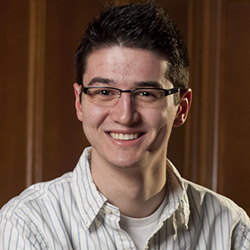
Nick Seewald
Department of Mathematics, Honors Track
Double major in Life Science
Advisor: David Galvin
Entropy and Counting
“The entropy of a random variable provides a measure of how surprised one should be at observing a specific outcome. I explore the properties of entropy that allow for the construction of upper bounds on the sizes of discrete spaces of objects. I have a strong interest in probability theory, and a course in discrete mathematics caught my eye. My project works with the intersection of these two fields and allows me to explore areas of mathematics I may wish to study in graduate school.”
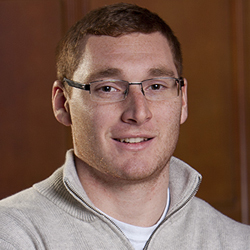
Edward Stivers
Department of Mathematics
Advisors: Alex Himonas and Tom Cosimano
Financial Applications of Partial Differential Equations
“I use partial differential equations to make sense of stochastic models of interest rates. I derive the prices of bonds under the various interest rate models and then show the implications of some of my assumptions regarding interest-rate movement. I had a summer internship that revolved around making calculations and adjustments based on fluctuations of interest rates. I found this topic very interesting and practical as a result of my work that summer.”
Vikram Saraph
Department of Computer Science
Supplementary major in mathematics, honors track
Advisor: Julia Knight
Index Sets of Computable Groups
“My research is in computable structure theory. I am currently producing original results specifically on the index set complexities of torsion-free Abelian groups and more generally on computable groups. My work is motivated by Rice’s theorem, which states that a nontrivial index set can never simply be computable. I chose this topic because it has the conceptual feel of theoretical computer science, specifically complexity theory. My eventual goal is to do research in theoretical computer science.”
